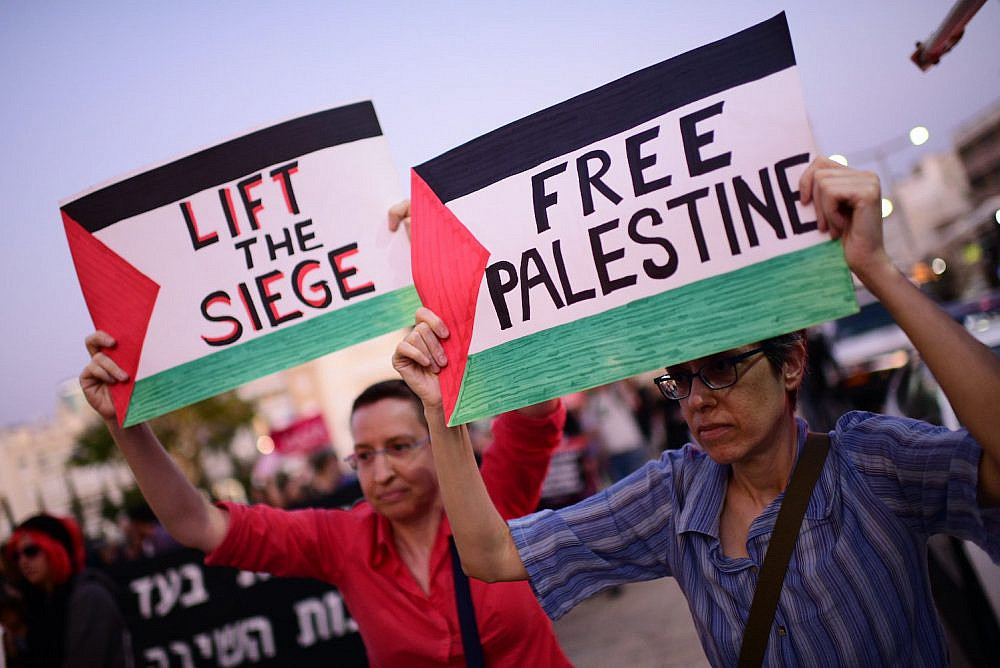Ever since violence broke out across Israel-Palestine in the past two weeks, the city of Jaffa, where I live, feels like it has been placed under military occupation. Armed police officers stand threateningly at central junctions, where they stop and harass nearly every Palestinian youth that passes. Every evening, security forces block roads, the buses stop arriving, and the police aggressively search homes, where they arrest young Palestinians and try to block the neighbors from taking photos or asking questions. Suffice it to say that the Israeli Jews of Jaffa live in a completely different reality.
And yet, as a queer Israeli Jewish activist, none of this makes me any safer.
All of this violence is supposedly committed in my name as an Israeli Jew. The government, the police, and the army tell us — the Jews who live in Jaffa — that this is for our own protection. When I hear that my neighbor’s son is being harassed by the police merely because he was sitting outside with friends while being Palestinian, when I hear of Arab university students who are chased and beaten by Jewish students and the police, when I hear of a relief fund in Gaza that was bombarded by Israeli airstrikes, when I hear of a Palestinian feminist psychologist who was killed by a bomb dropped on her building, when I watch a video of a Palestinian father yelling in grief next to the bodies of three of his family members — I cannot understand or accept that these things are done for my own protection.
This narrative of protection has been dictated again and again by the State of Israel ever since its establishment in 1948. It was there following the Nakba, in which more than 750,000 Palestinians were expelled from this land without the ability to return, when the Israeli government began waging a systematic campaign of ethnic cleansing against the Palestinian population between the river and the sea, when it placed Palestinian citizens under military rule for nearly two decades, when it passed discriminatory laws and expropriated Palestinian land, or as it maintains a 54-year occupation in the West Bank and more than a decade of siege on Gaza.
Now, following the attempts to expel Palestinian families from Sheikh Jarrah, the police attack on Al-Aqsa Mosque, the onslaught on Gaza, and the violence against Palestinian citizens of Israel, over 550 Israelis have published an open letter declaring our refusal to accept this Jewish supremacist regime. As individuals who have for years tried to shift public opinion, we have long come to the conclusion that changing the nature of this regime will be impossible without external intervention.
Like in Apartheid South Africa, we call upon the international community to intervene in defense of the Palestinians by placing pressure on Israel to end the occupation and the siege, allow Palestinian refugees to return to their homeland, reach a just and democratic solution, and establish a state of all its citizens.
As an Israeli Jew, I not only have the ethical duty to declare that these things not be done in my name — I have a duty to act against them and stand in solidarity with the Palestinian people. As Jewish Israelis, we need to relinquish the idea of Jewish supremacy — the idea that our so-called protection justifies systematic violence against Palestinians. This is a dangerous idea that not only values my life over that of the Palestinians around me, but also serves to divide the people living in this land and persuade Israeli Jews that their safety depends on ceaseless violence and plunder of Palestinians.
This has to stop, and the only way is for real pressure to be placed on our government from outside. Only then will the violence and oppression from our side end, and equality and true liberation for all people between the river and the sea can become a reality.

